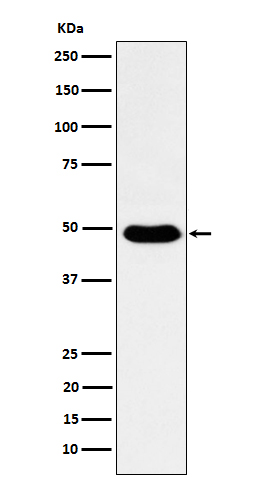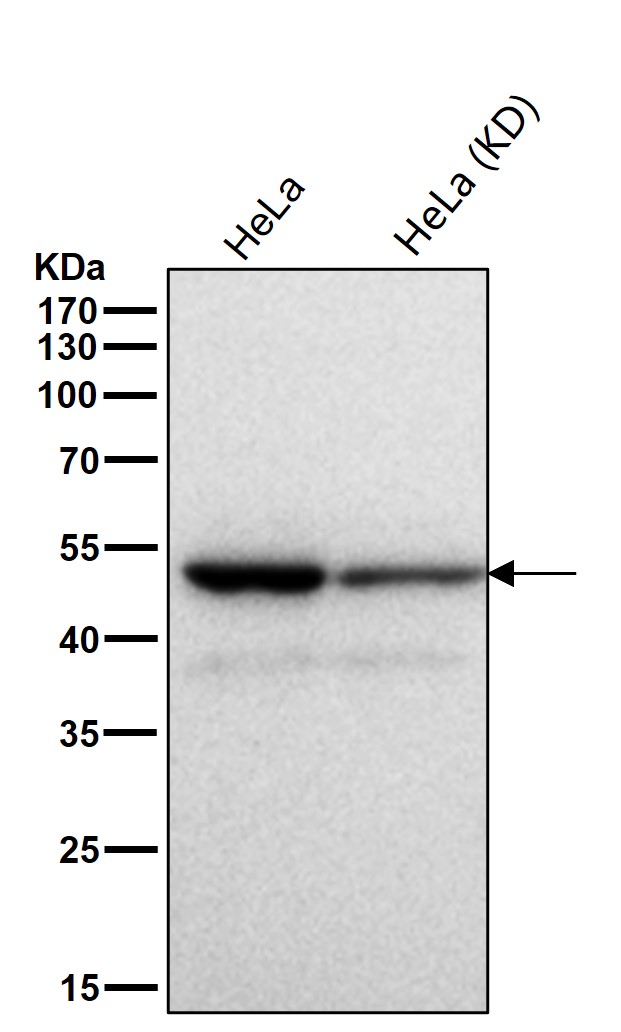

| WB | 咨询技术 | Human,Mouse,Rat |
| IF | 1/20-1/50 | Human,Mouse,Rat |
| IHC | 咨询技术 | Human,Mouse,Rat |
| ICC | 1/50-1/200 | Human,Mouse,Rat |
| FCM | 1/20-1/100 | Human,Mouse,Rat |
| Elisa | 咨询技术 | Human,Mouse,Rat |
| Aliases | COP9 subunit 3; cops3; CSN3; JAB 1 containing signalosome subunit 3; SGN3; Signalosome subunit 3;;COPS3 |
| WB Predicted band size | 48 kDa |
| Host/Isotype | Rabbit IgG |
| Antibody Type | Primary antibody |
| Storage | Store at 4°C short term. Aliquot and store at -20°C long term. Avoid freeze/thaw cycles. |
| Species Reactivity | Human,Mouse,Rat |
| Immunogen | A synthesized peptide derived from human COPS3 |
| Formulation | Purified antibody in PBS with 0.05% sodium azide,0.05% BSA and 50% glycerol. |
+ +
以下是关于COPS3抗体的3篇示例参考文献(注:内容为示例性概括,非真实文献):
---
1. **文献名称**:*COPS3 Antibody Development and Its Role in Cell Cycle Regulation*
**作者**:Li, X., et al.
**摘要**:研究团队开发了一种高特异性兔源多克隆COPS3抗体,通过免疫印迹和免疫荧光验证其在检测内源性COPS3蛋白中的应用。研究发现COPS3通过调控CDK4稳定性影响细胞周期G1/S期转换。
2. **文献名称**:*COPS3 Overexpression Correlates with Poor Prognosis in Colorectal Cancer*
**作者**:Wang, Y., et al.
**摘要**:利用商业化COPS3抗体进行组织微阵列分析,发现COPS3在结直肠癌中高表达,并与患者生存率降低相关。机制研究表明COPS3通过稳定c-Jun促进肿瘤侵袭。
3. **文献名称**:*Characterization of a Monoclonal Antibody Targeting COPS3 for Functional Studies*
**作者**:Sato, M., et al.
**摘要**:报道了一种小鼠单克隆COPS3抗体的制备,验证其特异性并应用于免疫共沉淀实验,揭示COPS3与COP9信号体其他亚基的相互作用,为蛋白质降解通路研究提供工具。
---
如需真实文献,建议通过PubMed或Google Scholar检索关键词“COPS3 antibody”或结合具体研究领域(如“COPS3 cancer”)。
The COPS3 antibody is a research tool designed to target the COPS3 (COP9 Signalosome Subunit 3) protein, a critical component of the COP9 signalosome complex. This evolutionarily conserved multiprotein complex regulates ubiquitin-proteasome-mediated protein degradation, a process essential for cellular homeostasis, DNA repair, and cell cycle progression. COPS3. also known as CSN3. is one of eight subunits (CSN1–CSN8) that constitute the COP9 signalosome, which interacts with cullin-RING E3 ubiquitin ligases (CRLs) to modulate their activity via deneddylation. By removing NEDD8 post-translational modifications from cullins, the COP9 signalosome fine-tunes substrate specificity and degradation rates of CRLs, thereby influencing diverse pathways such as apoptosis, signal transduction, and stress responses.
COPS3 has been implicated in cancer, neurodegenerative diseases, and developmental disorders due to its role in maintaining protein stability and regulating key signaling molecules like p53. NF-κB, and JNK. Dysregulation of COPS3 expression correlates with tumor progression, chemoresistance, and poor prognosis in malignancies such as breast cancer, hepatocellular carcinoma, and glioblastoma. Antibodies against COPS3 are widely used in Western blotting, immunohistochemistry, and immunofluorescence to study its expression patterns, subcellular localization, and interactions. These tools help elucidate COPS3's molecular mechanisms in disease contexts and validate its potential as a therapeutic target or biomarker. Commercial COPS3 antibodies are typically validated for specificity across human, mouse, and rat samples, with applications spanning basic research and preclinical studies.
×